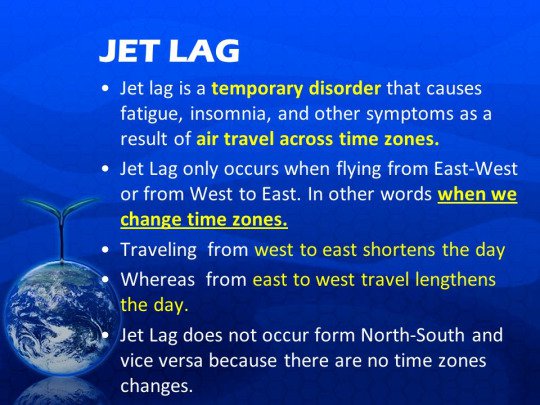Nearly 8 million people take flights every single day here on Earth. This works out to be billions of people that use planes annually. These trips may be for business, family vacation or a new start in life. Regardless, if these people travel across a few time zones they’re all susceptible to the yawning grip of jet lag. As we all know, science is used to better understand the natural world and to make our lives easier. So, can science help the billions of people worldwide that suffer from jet lag? How can we prevent jet lag?
While flights across the globe may be well planned, a recent discovery that may aid in combating jet lag certainly was not a planned event. This is one of those happy accidents in science that actually happens more than you think. In many regards, scientific research does not end with an “ah ha,” but instead a “hmm…that’s interesting.” This is precisely what happened in a recent study conducted on rats’ brains. Initially, the goal of the study was to find a way to fight cancer by studying a neural system, but the discovery made was both profound and unexpected.

Okay, so what does testing rats for cancer have to do with humans getting jet lag? Keep in mind that every living thing operates on a circadian rhythm, a day/night cycle that tells the body how and when to operate. Rats have one, humans have one, as do molds, shrews, fish, you name it. Our circadian rhythm, or our natural cycle, is partially responsible for our jet lag woes.
When we travel from central Virginia to the other side of the world our body can not operate efficiently right away. In fact, it takes nearly one day to recover from every time zone you cross during your trip. Going from central Virginia to Rome, Italy would mean you have traveled six time zones. If you leave Virginia around 7 am (as the Sun rises), factor in the 10 hour commute, then you’ll be landing in Italy at roughly 5 pm Virginia time. However, when you land in Italy, the time would actually be 11 pm. Your body is not ready to go to sleep because your natural rhythm is just getting ready for sunset, however in Italy the Sun set several hours ago. Your body does not have time to “catch up” to this new day/night schedule immediately. So, again, what does this have to do with the brains of rats?
One aspect of this neural research involved shutting down inhibitor cells in the brain. These cells react to varying oxygen levels and ultimately begin the body’s response to the change in oxygen intake. Scientists learned that by blocking the inhibitor cells, the body is no longer aware of how to react to lowered oxygen levels - but (and here’s the fun part) it also prevents the natural cycle from starting over. Basically, researchers observed that lowered oxygen intake as noticed by the inhibitor cells has something to do with restarting our natural cycles. Let’s take that thought one level further, lowered oxygen intake has something to do with restarting our body’s natural cycle.

There have been many studies done to show how sensors in the eye will activate the pineal gland at sunrise to begin our 24 hour cycle, but what this research hints towards is the possibility that maybe the pineal gland works in tandem with lowered oxygen levels at night to help regulate our body’s natural cycle. When we sleep our breathing becomes more shallow than during the daytime, meaning that we have lowered oxygen intake while we’re sleeping. This research is highlighting that oxygen intake plays a heavy role in restarting our natural cycle as we rest.
Jet lag sets in many hours after your commute, when you are in another part of the world that has different relative times to what you’re used to experiencing. For methods to fight jet lag, there’s yet another interesting variable to consider: our atmosphere is roughly 21% oxygen. Airplane cabins hold about 16% oxygen, a noticeably lower amount than our typical amount on the ground. For a while airplane companies have been working towards making the 16% oxygen level increase to the 21% we’re used to. However, with research findings, perhaps it’s not a bad idea for long flights to keep a lower level of oxygen to allow the body to restart the circadian rhythm before landing in a new time zone.
There’s still more research to be done, but this accidental discovery could very well lead to how we handle travel and physical efficiency in the near future. Oxygen intake and our natural day/night cycle seem to go hand in hand. Now, with more research we can find applications of this knowledge to help us reduce our jet lag. Can you imagine a long flight that does not end with jet lag? That’s certainly a breath of fresh air.